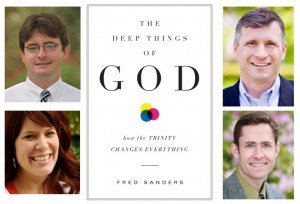 Biola’s website editor recently asked me a few questions about my new book, The Deep Things of God: How the Trinity Changes Everything, as part of an announcement for the upcoming book release event (Monday, Sept. 27). The first question was, “In a nutshell, what is the doctrine of the Trinity, and why is it so important?” My answer:
Biola’s website editor recently asked me a few questions about my new book, The Deep Things of God: How the Trinity Changes Everything, as part of an announcement for the upcoming book release event (Monday, Sept. 27). The first question was, “In a nutshell, what is the doctrine of the Trinity, and why is it so important?” My answer:
The doctrine of the Trinity is the Christian answer to the question, “Who is God?” It maintains a strict monotheistic commitment (Deut. 6:4-5), but it also acknowledges that Jesus Christ and the Holy Spirit are fully divine. If you think all those thoughts together at the same time, you end up with the doctrine of the Trinity: Father, Son, and Holy Spirit (Matt. 28:19) as three persons, one God.
Just the fact that it is true, and that it is based squarely on God’s self-revelation in Scripture, would be enough to make it important. The only alternatives are heresies.
But the doctrine of the Trinity is also important for a reason that evangelicals care about with more immediacy and urgency. That reason is that the Trinity is directly connected to the gospel. The good news is that God so loved the world that he sent his Son (John 3:16) to make us into children of God (John 1:12), and sent forth the Spirit of his Son to enable us to call him “Abba, Father” (Gal. 4:4-6). So the gospel is itself Trinitarian, and the Trinity is the gospel.
You asked me to put it in a nutshell, and I tried. But it’s a big doctrine. One of the chief characteristics of the Trinity is that it is expansive, comprehensive, holistic, and mind-stretching. So it takes a big nutshell.
Read the other two questions (“what is weak Trinitarianism,” and “what does it mean to be Trinity people”) at the Biola homepage.
Meanwhile, two new reviews of the book have appeared this week. Some people are fast readers!
David Steele (“Bald Reformer”) at Veritas et Lux starts out by saying the book “is not the best book I’ve read on the Trinity.” Uh oh, tough first sentence. But since goes on to say “However, it is among one of the more interesting,” I can’t complain. Steele rightly points out that Deep Things doesn’t develop the biblical and historical foundation of trinitarianism; for that readers should start elsewhere. But he nails what my book does set out to do:
Sanders introduces readers to the self-sufficiency of God in what he calls “the happy land of the Trinity.” In other words, God, from all eternity has always been happy and complete. There has been perfect fellowship among the members of the godhead from all eternity and there will continue to be perfect fellowship in eternity future. The author continually returns to the main theme, namely, “The main practical reason for learning how to think well about the eternal life of the Trinity is that it is the background for the gospel.”
Dave Jenkins (Who has over 11,000 Twitter followers! What’s up with that?) at Servants of Grace:
Unlike many books that are theologically driven, Dr. Sanders work does more than just consider the Scriptures but rather explains the Scriptures and then applies the Scriptures. This book is a first rate work. As one who has studied (formally and informally) and read a number of systematic theologies over the years there is simply nothing that I’ve read that even comes close to the work of Dr. Sanders in this book. It is clear that Dr. Sanders has given a great deal of thought to the topic of the Gospel and the Trinity… His writing style is very engaging which makes it easy to read and understand. This is why I am recommending that this book be read by any believer who is interested in learning how the Gospel connects to the Trinity.